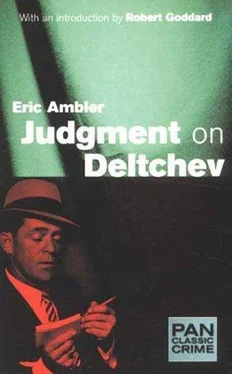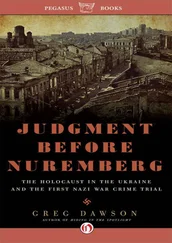Eric Ambler - Judgment on Deltchev
Здесь есть возможность читать онлайн «Eric Ambler - Judgment on Deltchev» весь текст электронной книги совершенно бесплатно (целиком полную версию без сокращений). В некоторых случаях можно слушать аудио, скачать через торрент в формате fb2 и присутствует краткое содержание. Год выпуска: 1977, ISBN: 1977, Издательство: Vintage, Жанр: Криминальный детектив, на английском языке. Описание произведения, (предисловие) а так же отзывы посетителей доступны на портале библиотеки ЛибКат.
- Название:Judgment on Deltchev
- Автор:
- Издательство:Vintage
- Жанр:
- Год:1977
- ISBN:9780307049971
- Рейтинг книги:4 / 5. Голосов: 1
-
Избранное:Добавить в избранное
- Отзывы:
-
Ваша оценка:
- 80
- 1
- 2
- 3
- 4
- 5
Judgment on Deltchev: краткое содержание, описание и аннотация
Предлагаем к чтению аннотацию, описание, краткое содержание или предисловие (зависит от того, что написал сам автор книги «Judgment on Deltchev»). Если вы не нашли необходимую информацию о книге — напишите в комментариях, мы постараемся отыскать её.
Judgment on Deltchev — читать онлайн бесплатно полную книгу (весь текст) целиком
Ниже представлен текст книги, разбитый по страницам. Система сохранения места последней прочитанной страницы, позволяет с удобством читать онлайн бесплатно книгу «Judgment on Deltchev», без необходимости каждый раз заново искать на чём Вы остановились. Поставьте закладку, и сможете в любой момент перейти на страницу, на которой закончили чтение.
Интервал:
Закладка:
Laughter.
‘Minister Vukashin, in presenting his arguments for negotiations with them, what advantages did the prisoner claim would follow?’
‘He claimed so many advantages that you would have supposed us conquerors about to impose our will upon the defeated. But what were the facts at that time? First …’
The earphones softly droned out the translation, but above this sound his own voice persisted. It was loud and, in the harsh, penetrating quality of its lower notes, disquietingly aggressive. He claimed hostility as urgently as another might claim love, and to hate him was to submit to a seduction. In a way he was impressive.
The voice went on and the grotesque rubbish it talked was passively received in evidence. I watched the judges’ faces as they listened.
The floodlights for the cameras were on all the time now. The day was warm, and soon, as the afternoon sun poured in through the high steel-framed windows, those in the lights began to sweat. Most of them wiped their heads frequently and fanned themselves; but the judges, sweltering in their black gowns and biretta-like caps, seemed unwilling to acknowledge their discomfort before the eyes of the cameras. They had been judges before the People’s Party had come into power and it was known that all such appointments were under review by the government. Later, perhaps, in a cool cinema at the Propaganda Ministry, the film would be examined by subtle, hostile men able to construe the wiping of hands or forehead as gestures of disrespect to the Minister and his evidence. No momentary relief from discomfort was worth that risk to the judges. Two of their older colleagues had already been dismissed for showing reluctance to preside at this trial. Now, behind the sweating impassivity of those who had not shown reluctance, there was the terrible anxiety of men who, having sacrificed their principles, fear that the sacrifice may after all go unrewarded.
Only the prisoner did not sweat. He sat with his hands in his jacket pockets and his eyes closed, the back of his white head resting against the wooden rail which separated the lawyers’ tables from the body of the courtroom. His face was livid in the glare of the lights and he looked as if he might faint; but, incredibly, he did not sweat. But for the pricking of your own skin you might have fancied that the heat of the place was an illusion and that all the perspiration you could see was simply a visible manifestation of collective guilt.
The afternoon crept on and the shadows moved slowly across the courtroom until there were only narrow strips of sunlight on the walls. There were no more than ten minutes to go before the day’s adjournment when the incident occurred.
Vukashin had almost completed his evidence and the Prosecutor was asking him a series of questions about the meeting of the Committee at which it had been finally decided to accept the armistice terms.
‘Minister Vukashin, what was the attitude of the prisoner when it was clear that the majority of the Committee favoured acceptance?’
‘As always, he attempted to obstruct the wish of the majority. He repeated all his former arguments, and when these were rejected again by the rest of the Committee, he said that he had had further discussion with the Anglo-American representatives and that something might yet be done with them.’
‘He gave the impression that he was making these proposals to them?’
‘He had always given that impression. But now in the heat of the moment he made a slip that revealed his true intention. He said that the Anglo-Americans were only waiting for the word and at the snap of his fingers they would come.’
At that moment a strange voice in the court said something loudly and sharply, and, in the dead silence that followed, the interpreter automatically translated it.
‘That is a lie.’
Deltchev had risen to his feet and was facing the witness box. His hands were still in his jacket pockets, but he was standing very straight.
Vukashin looked startled for a moment, then turned his head to the judges.
‘The prisoner objects to the truth.’
The centre judge leaned forward. ‘The prisoner will be silent.’
Deltchev took no notice. ‘I do not object to the truth,’ he said. ‘Nor do I object to the fantastic perversions of the truth that the court has been listening to today, for no person in his senses will accept them. I do, however, object to lies which attribute to me statements which I have never made.’
The judge shouted angrily: ‘Be silent. You will have an opportunity of speaking later.’
‘Will the Minister Vukashin be available to me for cross-examination?’
‘Your counsel may examine the witness if he wishes to do so.’
‘He does not propose to do so. He values his own skin too much.’
There was a commotion at this, and the thin, dark man whom I took to be Stanoiev began to make some sort of appeal to the judges. As several other people, including Dr Prochaska, were speaking at the same time, the interpreter became tongue-tied. One of the judges began to shout.
‘The presiding judges call for silence,’ said the interpreter.
Vukashin had been standing in the witness box looking on with a grim smile. Now he raised a hand and, as the noise subsided, spoke, ‘I have given my evidence. Let him say what he wants.’
Deltchev faced him again. There was complete silence now. The prisoner’s voice was light but very clear and precise.
‘Minister Vukashin,’ he said, ‘was it with the Committee’s knowledge that I made the proposal to the Anglo-American representatives in 1944 that we should fight a delaying action in the north?’
Vukashin hesitated a fraction of a second. ‘Be careful how you answer,’ Deltchev put in quickly. ‘The facts can be checked. The minutes of the Committee still exist.’
Vukashin made an impatient gesture. ‘I am aware of that.’
‘Then you see the need for caution. Will you answer the question, please?’
‘The reply is not as simple as you try to suggest. The Committee was aware that a proposal was made, but it was not aware that you hid instructions from your Anglo-American friends to make it appear that the proposal came from the Committee.’
‘Your answer is that I was authorized by the Committee to make the proposal.’
‘Yes, but …’
‘Let me continue, Minister. If the Committee authorized the proposal and if, as you say, the Anglo-American representatives wished it to be made, will you explain then why they did not immediately accept it?’
‘Do not please ask me to explain the actions of the Anglo-Americans.’
Laughter.
‘It is not the actions of the Anglo-Americans I am asking you to explain, but your own account of them.’
Vukashin turned angrily to the judges. ‘I am here to give evidence, not to answer political riddles. That is enough.’
‘You have been very patient. The court thanks you, Minister. The prisoner will be silent.’
Vukashin left the witness box and sat down. As he did so, Deltchev turned with a pale smile to face the courtroom. ‘The Minister is afraid to answer,’ he said.
It was at that point that Dr Prochaska made a foolish mistake. He had been standing there impotent and forgotten during this exchange. He was irritated. He was the Prosecutor and yet matters had been taken out of his, the responsible, hands, and an important battle of words had taken place without him. More serious still, the Minister, whom he should have protected, had had the worst of the battle. Now he saw his chance of retrieving not only his own dignity but that of the Minister as well. Never once since the trial opened had Deltchev taken his hands from his pockets, and Dr Prochaska had found the fact irritating. He suddenly thought he saw just how he might humiliate the prisoner.
Читать дальшеИнтервал:
Закладка:
Похожие книги на «Judgment on Deltchev»
Представляем Вашему вниманию похожие книги на «Judgment on Deltchev» списком для выбора. Мы отобрали схожую по названию и смыслу литературу в надежде предоставить читателям больше вариантов отыскать новые, интересные, ещё непрочитанные произведения.
Обсуждение, отзывы о книге «Judgment on Deltchev» и просто собственные мнения читателей. Оставьте ваши комментарии, напишите, что Вы думаете о произведении, его смысле или главных героях. Укажите что конкретно понравилось, а что нет, и почему Вы так считаете.












